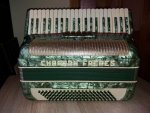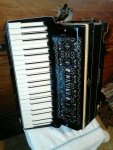Hi again, Thanks for details!
Lets see:
-I am a very beginner who is motivated to learn with a proffesional teacher.
Aha, thats a good idea! By the way, do you have previous experience in music?
-I do not know how to test but somebody will come with me.
Thats great news. I dare say, you then can choose any of the options. The most important for you now is to get accordion which will serve good for your exercises - and this will be mostly determined while testing. It is less related with brands (especially if brands are old).
It would be also good if the sellers allow moneyback or some other kind of guarantee.
-I am looking for a good shape and complete instrument suitable for eastern europe traditional music and cafe-concert( sorry if my english is not correct). Here I need your recommandation regarding the required registers for this kind of music.
-I would choose 120 in order not to change the instrument in the early future.
Well... These instruments with full keyboard... The main issue with them (for me) is they are large. They can weigh 9-11 kg I suspect. For my height of 170 cm it is bit too high when playing sitting.
Meanwhile you will rarely (if ever) have need for upper and lower end of the keyboard, given your choice of traditional music and cafe-concert. This means you may choose the 3/4 size accordion, with 34 keys (instead of 41). They are usually about 7kg and several inches shorter. It would be good to consult with the teacher who is going to teach you, but I think 3/4 accordion will serve you well for years.
As about bass buttons - it could be 80 or even 72 (though the more the better). Not extremely important because with playing traditional music you will usually be free to choose scale which places your fingers in the middle. More important is that there are 5 (or perhaps better 6 rows, with diminished chords).
Instruments with even smaller keyboard (e.g. 1/2 size of 24-26 keys) probably should not be regarded. Two octaves is bit too short even for some popular pieces and songs.
As about registers. This is not utterly important, but may be handy. I believe having 3 reeds in the right side would be good and enough. Often they have 5 switches here. This allows you to shift octave lower sometimes. Instruments with 4 reeds (they often may have about 11 switches) may be regarded as more professional (more expensive, more complicated and weigh more) - and probably their benefits are unimportant for your goals.
Registers in the left hand - it would be good to have them, mostly as a mean to manipulate the volume and air consumption (they disable several of 4-5 bass reeds). E.g. you may play with lower register switch at home, while with master outdoors or in the large hall. And probably more important - to keep volume balance with the right side. But no special significance for your goal also.
The last one is the Dallape. It is the most modern of the group, the best build quality and likely the best sound,
Having that many switches it looks like being 4-reeds instrument. And given full size - Im a bit suspicious it is sold for mere $500, if it is really in excellent condition.

Instead of buying an accordion straight away, have you considered hiring one ?
I readily agree!




